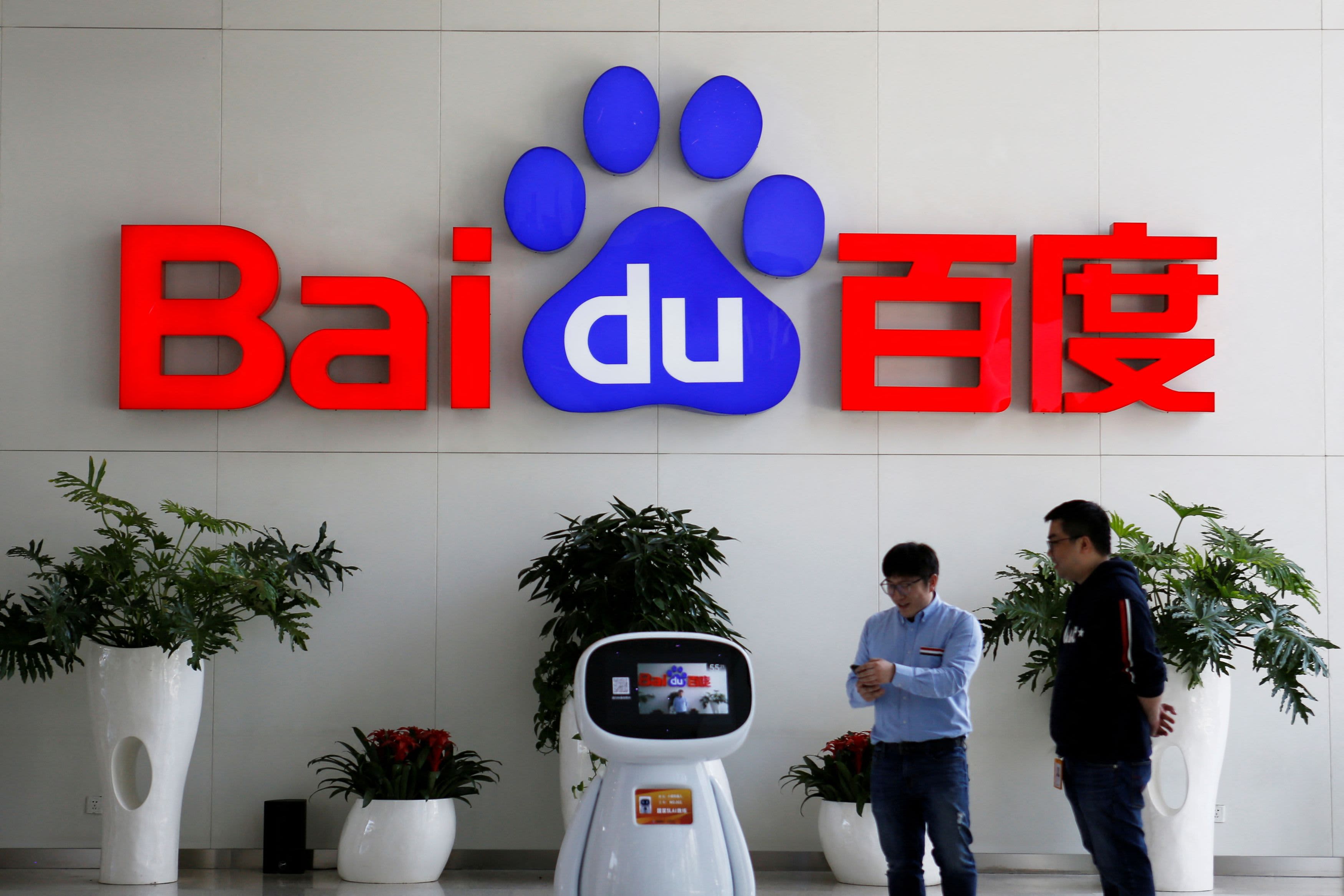Morgan Stanley Bullish on Baidu

Morgan Stanley analysts maintained their Overweight rating on Baidu (NASDAQ:BIDU), expressing optimism about the company's stock performance in the near term.
The analysts commented that there is a strong likelihood for the stock's price to rise in the next 60 days, citing its recent decline as a factor that has made its short-term valuation particularly attractive. The stock price, according to the analysts, has undergone a significant correction due to market concerns surrounding the recent developments with Ernie Bot. Despite these concerns, they foresee an improvement in Baidu's fundamentals towards the fourth quarter of 2023 and into 2024.
This anticipated improvement is expected to be driven by advertising growth outpacing GDP growth and a pivotal rise in cloud growth, fueled by incremental contributions from AI technologies. The analysts estimate a 70% to 80% probability, or a "very likely" chance, of this scenario occurring.
| Symbol | Price | %chg |
|---|---|---|
| 035420.KS | 267500 | 0 |
| 035720.KS | 65100 | 0 |
| 0700.HK | 629 | 0 |
| 80700.HK | 578 | 0 |

Baidu Inc. (NASDAQ:BIDU) Sees Promising Growth and Investment Potential
- Baidu Inc. (NASDAQ:BIDU) has a price target of $160 set by John Choi from Daiwa, indicating a potential upside of 32.65%.
- The stock has outperformed with a 9.5% rise over the past month, surpassing both the Zacks S&P 500 composite and the Zacks Internet - Services industry.
- Despite a recent price drop, Baidu's strong market position and substantial market capitalization of approximately $41.07 billion highlight its resilience and growth potential.
Baidu Inc. (NASDAQ:BIDU) is a leading Chinese technology company known for its internet-related services and products, including its popular search engine. As a major player in the tech industry, Baidu competes with other giants like Alibaba and Tencent. Recently, John Choi from Daiwa set a price target of $160 for Baidu, suggesting a potential upside of 32.65% from its current trading price of $120.62.
Baidu has been gaining traction on Zacks.com, becoming a trending stock. Over the past month, Baidu's shares have risen by 9.5%, significantly outperforming the Zacks S&P 500 composite's 1.1% increase. This strong performance also surpasses the 1.5% gain of the Zacks Internet - Services industry, showcasing Baidu's robust market position compared to its peers.
Despite the recent price drop of 3.93%, with Baidu trading at $120.79, the stock has shown resilience. It fluctuated between $119.10 and $121.90 during the day. Over the past year, Baidu's stock has seen a high of $149.51 and a low of $74.71, indicating its volatility and potential for growth.
Baidu's market capitalization is approximately $41.07 billion, with a trading volume of 5,451,271 shares. This substantial market cap reflects the company's significant presence in the tech industry. As highlighted by Zacks, changes in earnings estimates are crucial for evaluating Baidu's future performance, emphasizing the importance of fundamental analysis in investment decisions.

Baidu Inc. (NASDAQ:BIDU) Maintains Positive Outlook from Citigroup
- Citigroup maintains a "Buy" rating for Baidu Inc. (NASDAQ:BIDU), raising the price target from $143 to $166.
- Baidu's stock price sees a 3.31% increase, with a current price of $125.72.
- The company's focus on artificial intelligence and autonomous driving technology contributes to its strong position in the tech sector.
Baidu Inc. (NASDAQ:BIDU) is a leading Chinese technology company known for its internet-related services and products, including its popular search engine. The company is a major player in the field of artificial intelligence (AI) and autonomous driving technology. Baidu competes with other tech giants like Alibaba and Tencent in the Chinese market.
On October 13, 2025, Citigroup maintained its "Buy" rating for Baidu, with the stock priced at $125.72. Citigroup also raised Baidu's price target from $143 to $166, as highlighted by TheFly. This reflects a positive outlook on Baidu's future performance, aligning with the broader trend of optimism in the tech sector.
Baidu's current stock price of $125.72 marks a 3.31% increase, or $4.03, for the day. The stock has traded between $123.42 and $128.20 today. Over the past year, Baidu's stock has seen a high of $149.51 and a low of $74.71, indicating significant volatility. The company's market capitalization is approximately $42.74 billion.
The positive sentiment towards Baidu is part of a larger trend among major Wall Street firms, which have upgraded their outlook on several tech giants, including AMD, Oracle, and NVIDIA. This wave of optimism is largely driven by advancements in artificial intelligence, a field where Baidu is heavily invested.
Baidu's trading volume for the day is 4,970,440 shares, reflecting active investor interest. As the company continues to innovate in AI and other tech areas, it remains a key player in the industry, with potential for further growth as indicated by Citigroup's revised price target.

Baidu Inc. (NASDAQ:BIDU) Announces Strategic Financial Move
Baidu Inc., listed on the NASDAQ as BIDU, is a leading Chinese technology company known for its internet-related services and products. The company is a major player in the search engine market and has been expanding into artificial intelligence and autonomous driving technologies. Baidu's competitors include other tech giants like Alibaba and Tencent.
Baidu's recent announcement to offer CNY-denominated senior notes is a strategic move to raise capital. This initiative is crucial for the company as it aims to strengthen its financial position. With total assets of approximately ¥450.6 billion and total liabilities of ¥152.7 billion, Baidu is in a strong position to leverage this capital for growth. The capital raised from these notes could be used for refinancing existing debt or funding new projects.
Baidu's long-term debt stands at approximately ¥55.6 billion, and the company holds cash and cash equivalents totaling about ¥29.9 billion. This financial strategy could help Baidu manage its debt more effectively and invest in future projects. Investors are likely to be interested in Baidu's growth prospects and financial strategies. As highlighted by Susquehanna, Baidu's stock was rated as Neutral with a price target of $95, while the stock price was $96.29. This indicates a stable outlook, which could attract investors looking for steady growth.
Baidu's financial health is further supported by its total stockholders' equity of approximately ¥275.1 billion. With account payables around ¥38.2 billion and net receivables of ¥12.3 billion, Baidu is well-positioned to manage its financial obligations. This solid financial foundation is likely to support the company's expansion efforts.

Baidu Inc. (NASDAQ:BIDU): Navigating Market Challenges with AI and Cloud Services

Baidu Beats on Q1 Revenue as AI Cloud Offsets Weakness in Ads
Baidu (NASDAQ:BIDU) reported stronger-than-expected first-quarter revenue, driven by surging growth in its AI cloud business, which helped counterbalance softness in its core advertising operations amid a sluggish Chinese economy.
Revenue from Baidu’s core segments rose 7% year-over-year to 25.5 billion yuan ($3.53 billion), topping analyst estimates of 23.17 billion yuan. A standout was the AI Cloud division, where sales jumped 42%, highlighting growing enterprise demand for Baidu’s full-stack AI solutions and competitive pricing.
The cloud unit's accelerating momentum comes as AI increasingly becomes a central pillar of Baidu’s strategy. The company has continued to invest in its Ernie AI platform—China’s answer to ChatGPT—despite rising competition, including lower-cost offerings from challengers like DeepSeek.
Baidu also noted upgrades to its Qianfan mobility services platform, enhancing its capabilities for training and fine-tuning reasoning models, and released a new version of its PaddlePaddle deep learning framework in April.
While marketing revenues remained under pressure, the strong performance in AI cloud underscores Baidu’s ongoing pivot toward high-growth, innovation-led areas of the business.

Baidu Inc. (NASDAQ:BIDU) Quarterly Earnings Preview and Strategic Expansion into Europe
Baidu Inc. (NASDAQ:BIDU) is a leading Chinese technology company known for its internet services and artificial intelligence capabilities. As it prepares to release its quarterly earnings on May 15, 2025, analysts expect an earnings per share (EPS) of $1.96 and a revenue of approximately $31 billion. The earnings report will be available before the market opens, providing insights into the company's financial health. Baidu is expanding its reach with the launch of its driverless ride-hailing service, Apollo Go, in Europe.
This strategic move, as highlighted by the Wall Street Journal, marks Baidu's entry into the European market, showcasing its ambition to become a major player in the global autonomous vehicle industry. This expansion could potentially impact future earnings and revenue growth. The company's financial metrics provide a snapshot of its market valuation. Baidu's price-to-earnings (P/E) ratio is approximately 10.90, indicating how the market values its earnings. The price-to-sales ratio is about 1.72, reflecting the market's valuation of its revenue. These ratios suggest that Baidu is valued reasonably in comparison to its earnings and sales. Baidu's enterprise value to sales ratio is around 2.12, which includes debt and excludes cash, showing how the market values the company relative to its sales. The enterprise value to operating cash flow ratio is approximately 13.64, indicating the market's valuation of Baidu's cash flow from operations. These figures highlight the company's financial stability and operational efficiency.
The company's debt-to-equity ratio is approximately 0.30, suggesting a relatively low level of debt compared to its equity. This indicates a strong financial position, allowing Baidu to invest in growth opportunities like Apollo Go. Additionally, Baidu maintains a current ratio of about 2.09, demonstrating its ability to cover short-term liabilities with its short-term assets, further underscoring its financial health.

Macquarie Cuts Price Target for Baidu
Macquarie trimmed its price target on Baidu (NASDAQ:BIDU) from $85 to $83, maintaining a Neutral rating, as the Chinese tech giant grapples with a slow-moving macro environment and stiff competition in the search market.
While Baidu has been increasing the share of AI-generated content in its search platform, analysts remain cautious about the timeline for meaningful AI monetization. The firm's core advertising business is expected to shrink further, with first-quarter revenue projected to decline 6% year-over-year to RMB 15.9 billion—slightly below market consensus.
Despite ad pressure, Baidu's AI Cloud segment is showing promise. Enterprise adoption continues to climb, with AI Cloud revenue anticipated to rise 25% year-over-year to RMB 5.9 billion, helping to cushion the impact of weaker ad sales.
Meanwhile, Baidu’s autonomous driving initiative is shifting its sights overseas. The company’s Robotaxi service, which has already surpassed 10 million rides and 150 million kilometers in China, is targeting global expansion. A partnership in Dubai sets the stage for deploying 100 Robotaxis by the end of 2025, and scaling up to over 1,000 by 2028. Baidu is also eyeing high-value markets like Europe and Japan to boost revenue per ride, while working to lower operational costs through vehicle hardware and personnel reductions.
However, given its early stage and limited revenue contribution, Robotaxi development is not yet included in Macquarie's valuation model for Baidu.







